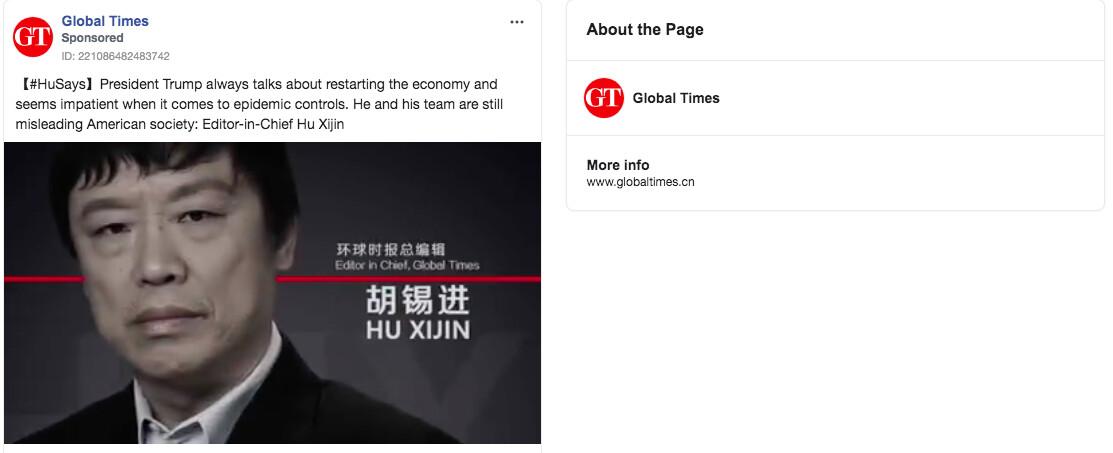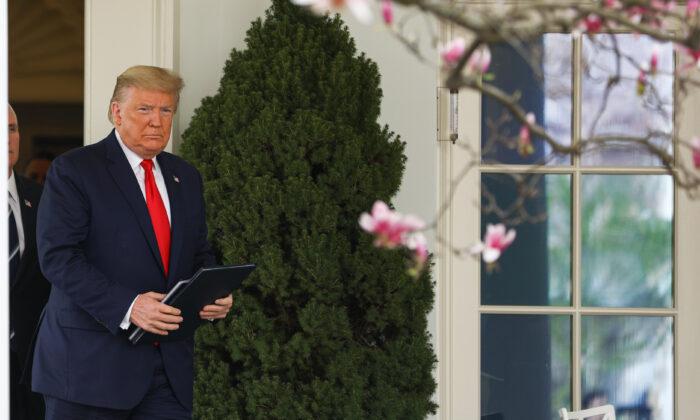The Chinese Communist Party (CCP) is using its state-run social media accounts, which boast tens of millions of followers, to spread disinformation via Facebook and Instagram advertisements in an attempt to criticize President Donald Trump and alter the narratives on the CCP virus pandemic.
The ads, many of which ran with no political disclaimer, were spread to English-speaking audiences across the world through China’s major state-controlled media companies, including the Global Times, Xinhua News Agency, China Central Television (CCTV), and China Global Television Network (CGTN).
That changed when February hit.

The CCP seeks to draw attention to the failures of other nations as they grapple with COVID-19 and deflect scrutiny from their own bungled response, Brooking said.
Walter Lohman, director of The Heritage Foundation’s Asian Studies Center, called the pivot to attack ads “another front for the CCP to use,” adding that from China’s perspective, “this is a matter of an existential threat.”
But Brooking, like other China experts, says the truce is temporary, if at all.
“Just because the information war is less visible, this does not mean that it has stopped,” he said. “The rhetoric between Trump and Xi has indeed softened, but conspiracy theories about coronavirus continue to spread at an alarming rate.
“This perceptual battle is too important to both the United States and China for either side to abandon it entirely,” Brooking added.
Lohman said Beijing will do whatever it takes to preserve its own rule and that this “will always involve a sort of public-opinion warfare aimed at the U.S.”
“We are progressing on our plans to label state-controlled media pages on Facebook, including from China, and will have more to share on this soon,” the spokesperson said. “We are continuing to work with publishers and third-party experts on this issue to ensure that we get this right.”
Facebook said the ads not labeled as “political” by state-run media would “simply have disappeared once they expired, making it virtually impossible to assess the full scale of China’s propaganda effort,” according to VICE.
‘Soft Power’
The CCP is attempting to use its “soft power” to influence public opinion around the world, which is now turning decisively against Beijing, says Steven Mosher, president of the Population Research Institute and a founding member of the Committee on the Present Danger: China.“In 2007, Hu Jintao (former general secretary of the CCP) told the Seventeenth Party Congress that it was time to fight back against the West and launch its own soft-power initiative,” Mosher told The Epoch Times. “Since then, the CCP has spent billions to extend its media outreach around the world.”
Beijing officials have previously accused the United States of being the origin of the CCP virus as part of a wider propaganda initiative that draws upon every weapon in its arsenal, including “online, print, and broadcast media that it has purchased or fostered over the past 12 years,” Mosher said.
The extent or effect of these ads on Americans is unclear.
The “less they know about China, the more they will be swayed” by disinformation, Mosher said. Due to the CCP virus, however, more people are paying attention to the dangers of the regime in Beijing, he added.
“A few Facebook ads are probably not sufficient to counter the fear and anxiety they are feeling for themselves and their families that the CCP’s evil and incompetence have stoked,” he said, referring to the American public.
The political ads may “muddy the waters,” but Lohman said the reaction is far more likely to center on people’s confirmation bias.
“Those who already feel favorable toward China will feel that they are not alone, that there are others who feel the same way,” he said. “And of course, it will be unwittingly picked up by some who are motivated principally by their political opposition to Trump.”
Attila Tomaschek, digital privacy expert at ProPrivacy.com, told The Epoch Times that the CCP propaganda machine “is working at full tilt” and that should come as no surprise because it’s exactly how the regime operates. Despite some political advertisements gaining a large number of views, he said most Americans know to take anything from China’s state-run media with a “giant grain of salt.”
At the same time, the CCP wants to exploit the pandemic to “hold itself up as a ’model' on how to deal with the epidemic,” Mosher said, noting that China is worried that other nations will unite against it.
“The ultimate reason is that [China] is at war with the United States across all domains except the kinetic, and is desperately and belatedly trying to turn defeat into victory where the CCP virus is concerned,” he said.
Some China experts told The Epoch Times that U.S. tech companies shouldn’t ban Chinese officials and state-run media from their platforms, while others said they should.
“Chinese officials and state-run media are trying to reach a global audience. That is why they have access to social media,“ Lohman noted. ”The U.S. government, and Americans more generally, business and media, should miss no opportunity to point out this contradiction.”
“I have long thought that we should demand absolute parity with China in all things,” Mosher added.
In addition, U.S. lawmakers have called for the Chinese regime to be punished for its role in covering up and lying about the pandemic, which allowed the virus to spread to more than 200 countries.






Friends Read Free